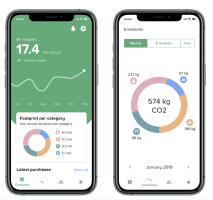This is from the Evil Empire over at the World Economic Forum and its billionaire and deranged whack job leaders like Henry Kissinger and Klaus Schwab. As you can see they are hellbent on implementing their deluded carbon reduction plan. If, as they claim, it’s the greenhouse gas carbon dioxide that’s the issue (and at 0.04% of our atmosphere that’s unlikely) ‘sequestering’ carbon is futile. Another virtue signaling misdirect to ensure all resources remain in the hands of our overlords and we’re crammed like cattle into inner cities.
There have been significant developments in last five to seven years on social, environment and technology fronts that could help realise “My Carbon” initiatives for shaping the future towards smart and sustainable cities.
Specifically, to mention three developments in this context:
😲 OMFG this is actually real
— #FtheWEF till the day I die (@NEOintheMCR) September 20, 2022
🚗 There is a new WEF article on how COVID lockdowns, social distancing, contact tracing, masks and Vs was all a "test" to see if we will accept the "social responsibility" of "tracking personal carbon emissions"#FtheWEFhttps://t.co/VvfxAvgp5l
1. COVID-19 was the test of social responsibility – A huge number of unimaginable restrictions for public health were adopted by billions of citizens across the world. There were numerous examples globally of maintaining social distancing, wearing masks, mass vaccinations and acceptance of contact-tracing applications for public health, which demonstrated the core of individual social responsibility.
Inclusivity of citizens is becoming the most important element of success or failure in the journey towards sustainability. Community-led initiatives can make a significant contribution towards sustainability, increase resilience and social cohesion. There have been numerous examples of personal carbon allowance programs in discussions for the last two decades, however they had limited success due to a lack of social acceptance, political resistance, and a lack of awareness and fair mechanism for tracking “My Carbon” emissions.
2. Fourth Industrial Revolution technology breakthroughs – Advances in emerging technologies like AI, blockchain and digitization can enable tracking personal carbon emissions, raise awareness and also provide individual advisories on lower carbon and ethical choices for consumption of product and services. The World Economic Forum’s Scale 360 initiative demonstrates the use of fourth industrial revolution technologies across the whole life cycle of products and services.
There have been major advances in smart home technologies, transport choices with carbon implications, the roll-out of smart meters in providing individual choices to reduce their energy-related emissions, the development of new personalized apps to account for personal emissions, and better personal choices for food and consumption-related emissions. AI can also help strengthen circular economy business models like product as a service models, demand predictions, and smart asset management by combining real time and historical data from products and users.
There is a significant number of programs and applications enabling citizens to contribute towards carbon emissions by providing them in-depth awareness on the choices of personal carbon for food, transport, home energy and lifestyle choices.
These energy efficiency apps give suggestions and statistics regarding greenhouse emissions and offer ways to reduce your personal footprint. Keeping track of energy consumption in the home and motivating people to make lifestyle changes and to contribute your share towards the betterment of the environment.
3. Raised awareness and ownership for nature and environment – In the last few years, there is an increased awareness and public concern on climate change and specially among youth. The UNDP’s “Peoples’ Climate Vote” reflects that over 64% of people believe climate change is a global emergency. A new Pew Research Center survey in 17 advanced economies found widespread concern about the personal impact of global climate change: 80% of citizens say they are willing to change how they live and work to combat the effects of climate change. Young adults, who have been at the forefront of some of the most prominent climate change protests in recent years, are more concerned than their older counterparts about the personal impact of a warming planet in many public surveys.
And if there’s any doubt who is really behind all this BS check this out.
